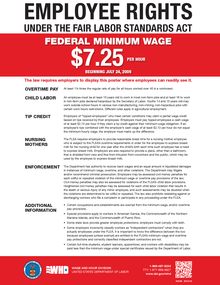
Back قانون معايير العمل العادل لعام 1938 Arabic ফেয়ার লেবার স্ট্যান্ডার্ডস অ্যাক্ট ১৯৩৮ Bengali/Bangla Fair Labor Standards Act French 公正労働基準法 Japanese Закон о справедливых условиях труда (1938) Russian Fair Labor Standards Act SIMPLE 1938年公平勞動標準法 Chinese

The Fair Labor Standards Act of 1938 29 U.S.C. § 203[1] (FLSA) is a United States labor law that creates the right to a minimum wage, and "time-and-a-half" overtime pay when people work over forty hours a week.[2][3] It also prohibits employment of minors in "oppressive child labor".[4] It applies to employees engaged in interstate commerce or employed by an enterprise engaged in commerce or in the production of goods for commerce,[5] unless the employer can claim an exemption from coverage. The Act was enacted by the 75th Congress and signed into law by President Franklin D. Roosevelt in 1938.
- ^ Pub. L. 75–718, ch. 676, 52 Stat. 1060, June 25, 1938
- ^ Samuel, Howard (December 2000). "Troubled passage: the labor movement and the Fair Labor Standards Act" (PDF). Monthly Labor Review. United States Bureau of Labor Statistics. Retrieved August 20, 2014.
- ^ See and 29 U.S.C. § 212.
- ^ "Fair Labor Standards Act - FLSA - 29 U.S. Code Chapter 8". finduslaw.com.
© MMXXIII Rich X Search. We shall prevail. All rights reserved. Rich X Search
